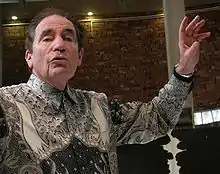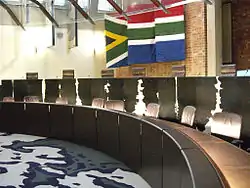Albie Sachs
Albert "Albie" Louis Sachs (born 30 January 1935) is an activist and a former judge on the Constitutional Court of South Africa.[1] After having his arm blown off by a car-bomb in Mozambique due to his opposition to apartheid, he fled to the United States but later returned to South Africa and currently resides in Cape Town.
Albert Sachs | |
|---|---|
 | |
| Justice of the Constitutional Court | |
| In office November 1994 – October 2009 | |
| Nominated by | Judicial Service Commission |
| Appointed by | Nelson Mandela |
| Personal details | |
| Born | Albert Louis Sachs 30 January 1935 |
| Nationality | South African |
| Spouse(s) | Stephanie Kemp
(m. 1966; div. 1980)Vanessa September (m. 2006) |
| Children | 3 |
| Education | |
Early life and education
Sachs was born into a South African family of Lithuanian Jewish background. He attended the South African College School (SACS) in Cape Town. As a second year law student at the University of Cape Town, where he earned his LLB, he took part in the Defiance Campaign.[2] Three years later, in 1955, he attended the Congress of the People at Kliptown, where the Freedom Charter was adopted. Sachs later moved to the UK when he first fled to exile from South Africa and went to study for a PhD at the University of Sussex, which he gained in 1972 under the Supervision of Colonel Draper.[3]
Career
Early career
Sachs started practice as an advocate at the Cape Bar aged 21, defending people charged under racial statutes and security laws under South African apartheid. After being arrested and placed in solitary confinement for over five months for his work in the freedom movement, Sachs went into exile in England, where he completed a PhD from Sussex University, and later Mozambique. In 1988, in Maputo, Mozambique, he lost an arm and his sight in one eye[4] when a bomb was placed in his car. After the bombing, he devoted himself to the preparations for a new democratic constitution for South Africa. He returned to South Africa and served as a member of the Constitutional Committee and the National Executive of the African National Congress, before seeking asylum in the United States.
Judicial career
Sachs was appointed to the Constitutional Court of South Africa by Nelson Mandela in 1994.[4] His appointment was controversial, primarily because of his conduct at his JSC interview, where he was asked about his role in a report downplaying the ANC's indefinite detention and solitary confinement of Umkhonto we Sizwe commander Thami Zulu.[5] One commissioner told Sachs his answers were "appalling" and criticised him for "sell[ing] his soul" by signing onto the report.[5] One prominent lawyer later said that if Sachs's interview had been more widely publicised he "could not possibly have been on the Court".[6] Sachs felt the criticism was unfair given his central role in ending torture in ANC camps.[7]
Many of Sachs's best-known judgments are on discrimination law. He was the main author of the majority judgment in Prinsloo v Van der Linde,[8] which established the connection between the right to equality and dignity. He was the author of the Court's majority judgment in Minister of Home Affairs v Fourie, in which the Court declared unconstitutional South Africa's statute defining marriage to be between one man and one woman.[9] O'Regan J strongly criticised Sachs for referring the regulation of same-sex marriage to Parliament rather than providing immediate relief. The two had, in 2002, written a joint dissent which held that the criminalisation of sex work (and not its solicitation) unfairly discriminates on the basis of gender and is therefore unconstitutional.[10]
Sachs retired in October 2009, along with Pius Langa, Yvonne Mokgoro and Kate O'Regan.[11]
Writings
In 1991, Sachs won the Alan Paton Award for his book Soft Vengeance of a Freedom Fighter, which chronicles his response to the 1988 car bombing.[12] He is also the author of Justice in South Africa (1974), The Jail Diary of Albie Sachs (1966), Sexism and the Law (1979), and The Free Diary of Albie Sachs (2004). His most recent book, The Strange Alchemy of Life and Law (2009), also won the Alan Paton Award, making him the second person to have won it twice.[13] The Jail Diary of Albie Sachs was dramatized for the Royal Shakespeare Company by David Edgar, as well as for television and broadcast by the BBC in the late 1970s.[14]
Additional affiliations and memberships
Sachs has served as a member of the Kenya Judges and Magistrates Vetting Board.[15] He is currently an A.D. White Professor-at-Large at Cornell University.
Awards and recognitions
Sachs has 14 honorary degrees across four continents.[16] In 2009 he received the Reconciliation Award. In 2009 he received the Golden Plate Award of the American Academy of Achievement presented by Awards Council member Archbishop Desmond Tutu at an awards ceremony at St. George’s Cathedral in Cape Town, South Africa.[17][18] On 21 June 2014 he was awarded Taiwan's inaugural Tang Prize in the Rule of Law for his contributions to human rights and justice globally.[19][20] In 2015 Sachs was named a Ford Foundation Art of Change Fellow. Sachs had helped select the art collection at Constitution Hill, the seat of the Constitutional Court.[21]
Personal life
In 1966 he married Stephanie Kemp, a member of the African Resistance Movement, ANC and SACP, in London. They had two children: Alan (an artist) and Michael (a developmental economist).[22] In 1980 they divorced and Stephanie remained in London until 1990 working as a paediatric physiotherapist.[23] He remarried in 2006 to urban architect Vanessa September in the Constitutional Court and they have a son, Oliver Lukutandu September Sachs.[24]
References
- "Albie Sachs". Who's Who Southern Africa. Retrieved 27 July 2014.
- File: Participants in the 1952 Defiance Campaign Archived 8 June 2010 at the Wayback Machine
- http://www.sussex.ac.uk/broadcast/read/50648
- "Justice Albie Sachs". Constitutional Court of South Africa. Retrieved 27 July 2014.
- "JSC interview: Albert Louis Sachs". Constitutional Court. 4 October 1994.
- "Constitutional Court Oral History Project: Dennis Davis" (PDF). 6 January 2012.
- "Constitutional Court Oral History Project: Albie Sachs" (PDF). 10 January 2012.
- Prinsloo v Van der Linde and Another (1997) ZACC 5; 1997 (3) SA 1012 (CC).
- Minister of Home Affairs and Another v Fourie and Another (2005) ZACC 19; 2006 (1) SA 524 (CC).
- S v Jordan and Others (Sex Workers Education and Advocacy Task Force and Others as Amici Curiae) (2002) ZACC 22; 2002 (6) SA 642 (CC).
- Alcock, Sello; Russouw, Mandy (29 May 2009). "Zuma's judges dilemma". Mail & Guardian.
- Patrick Barkham (7 October 2011). "Albie Sachs: 'I can't tell my son everything'". The Guardian. Retrieved 27 July 2014.
- Emily Amos (26 July 2010). "More Coverage of the Sunday Times Literary Awards (Photos, Videos)". Books Live. Archived from the original on 21 November 2010. Retrieved 27 July 2014.
- "The Jail Diary of Albie Sachs (1981)". IMDb. Retrieved 27 July 2014.
- "Profile". Archived from the original on 9 April 2013. Retrieved 27 December 2012.
- Archived 2 April 2012 at the Wayback Machine
- "Golden Plate Awardees of the American Academy of Achievement". www.achievement.org. American Academy of Achievement.
- "2009 Summit Highlights Photo".
Desmond Tutu presents the Academy’s Golden Plate Award to Albie Sachs of South Africa’s Constitutional Court.
- Tang Prize awarded to S African activist Archived 4 July 2014 at the Wayback Machine
- "Sachs honoured for contribution to human rights". News 24. AFP. 21 June 2014. Retrieved 27 July 2014.
- "The Constitutional Court Art Collection – Constitution Hill". www.constitutionhill.org.za. Retrieved 29 May 2020.
- Patrick Barkham (8 October 2011). "Albie Sachs: 'I can't tell my son everything'". The Guardian. Retrieved 9 December 2016.
- "Biography of Stephanie Kemp". South African History Online. 24 May 2016. Retrieved 9 December 2016.
- Peter Lind (9 December 2016). "Cape Town slave descendants share stories of strength". Aljazeera. Retrieved 9 December 2016.
External links
- Biography at the Constitutional Court of South Africa website
- Albie Sachs Biography and Interview on American Academy of Achievement
- An interview with Albie Sachs by the Conversations with History program of the Institute of International Studies, UC Berkeley
- Voices on Antisemitism Interview with Albie Sachs from the US Holocaust Memorial Museum
- Interview with Justice Sachs on Chicago Public Radio's Worldview program
- Hear his talk "The South African Court Looks At Same-Sex Marriages: The Fourie Case" at the University of Chicago
- Interview with Albie Sachs on The Strange Alchemy of Life and Law, "The Law Report" (Australian Broadcasting Corporation), 14 September 2010
- On idealism, passion and reason in South Africa Albie Sachs Speaks on BBC The Forum
- Albie Sachs Freedom Collection interview
- Phila Portia Ndwandwe BLUE DRESS
| Wikisource has original works written by or about: Albie Sachs |
